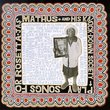| All Artists: The Monteverdi Choir, Orchestre Revolutionnaire et Romantique, John Eliot Gardiner Title: Brahms: Symphony No. 3, Ich schwing mein Horn ins Jammertal Op. 4/1, Es tont ein Voller Harflenklang Op. 17/1, Nachtwache I Op. 104/1, Einformig ist der Liebe Gram Op. 113/13, Gesang der Parzen Op. 89, Nanie Op. 82 Members Wishing: 0 Total Copies: 0 Label: SDG - Soli Deo Gloria Original Release Date: 1/1/2009 Re-Release Date: 9/8/2009 Genre: Classical Style: Symphonies Number of Discs: 1 SwapaCD Credits: 1 UPC: 843183070428 |
Search - The Monteverdi Choir, Orchestre Revolutionnaire et Romantique, John Eliot Gardiner :: Brahms: Symphony No. 3, Ich schwing mein Horn ins Jammertal Op. 4/1, Es tont ein Voller Harflenklang Op. 17/1, Nachtwache I Op. 104/1, Einformig ist der Liebe Gram Op. 113/13, Gesang der Parzen Op. 89, Nanie Op. 82
CD DetailsSimilar CDs
|
CD ReviewsA Muscular, Speedy and Compelling Rendition Scott Harris | Chattanooga, TN | 09/19/2009 (5 out of 5 stars) "If you have been following Gardiner's Brahms cycle thus far, the one thing that has struck many listeners is the lack of controversial tempi that he and his orchestra have taken for Symphonies 1 & 2. To be sure, Gardiner is on the swifter side of the spectrum, but nothing so outrageous that everyone commented on it. This performance may change that. The first movement is played quite quickly, but the playing itself is never less than very good. He has divided the violins left and right and the brass, especially the natural horns, cut right through to be heard, along with the woodwinds. The second and third movements are played more within conventional tempi expectations, but things again move right along for the last movement where, for the first time, I found myself wishing he would have slowed things down just slightly. Nevertheless, if you are collecting this series of releases (like me), there is nothing here that is so disconcerting as to bar purchase. In the same vein, we are again treated to a number of Brahms' choral works, none performed with quite as much raw power and passion as the Gesang der Parzen. If you enjoy this choral work, you really owe it to yourself to hear this performance. The singing if top-notch as is the orchestral playing. The other works are smaller, but quite interesting. A word about the sound - these performances were recorded live at the refurbished Royal Festival Hall, in London. It now has a nice degree of bloom and perspective to its sonic signature, though there is still not a great deal of low bass (perhaps also a result of the period orchestra). If this was an SA-CD release, I think we'd hear more of that, but it is instead a 2-channel, albeit well-recorded, redbook CD. Leopold Stokowski once remarked that the Brahms symphonies were akin to a sculpture or painting in which some elements were the main lines or foreground, while others should be more in relief or in the background. By this he meant that some elements of the orchestra (violins, basses) were to carry the symphony, with others in a supporting role. No doubt Stokowski was referring to what many would call the "Brahms tradition" or the way his symphonies have been approached by many prominent conductors since the early 20th century. In the liner notes to this recording, Gardiner states that no one can construct the original Brahms and that trying to do so is futile; his interest is in exploring what Brahms "can sound like in our day" and "what his music can say to us now". I would strongly urge everyone to listen to the results." A spectacular performance Halvor Hosar | Norway | 12/15/2009 (4 out of 5 stars) "Since this is a recording featuring Sir John Eliot Gardiner (and his two armies of generals, the Monteverdi Choir and the Orchestre Révolutionnaire et Romantique), people will probably already know a lot of what is to be expected: Fast tempi, period-correct orchestration and a flawless performance. First, let's have a look at the content aside from the symphony. Like the other cds in Gardiner's Brahms cycle this cd features choral works; Brahms' works for choir and accompaniment actually make up a rather large part of his oeuvre, most of which is sadly neglected today (The Requiem and the Alto Rhapsody are the exceptions). I had not heard Gesang der Parzen before I got this cd, and I was in for a real surprise. This work is a wonderful piece, and why it isn't heard more often baffles me. It has all the characteristic Brahmsian elements: The dynamic flexibility, the incredibly angry crescendi, and all the weltschmerz one could wish for. Nänie is probably a more famous work, and is given full justice here. My only gripe with Gardiner is that, for all the musical worth of him and his ensembles, sometimes his tempi are so high that the pieces lose some of their monumentality. This is not the case here; these pieces are, to my ears, played at an optimal tempo. There are a few other, smaller choral pieces from early in Brahms' carreer on here. These works are pleasant, but I think most people won't give them too many listens. Unlike the other cds in the Brahms cycle, there's no choral music by other composers on this cd. Given Gardiners' reasoning for including these piece (illuminate the debts Brahms owed to earlier masters) this may be considered both a strength and a weakness. I do not know the reason for this, but Brahms certainly have enough excellent choral music that stands on it's own. Now, onward to the symphony itself. Whether Gardiner's sonic approach to these pieces are historical or not is a question I can't answer, and in all honesty don't think is that interesting; What really matters is how the result sounds. From a timbral perspective, this version of Brahms' third is quite unique. Mostly all versions of it feature a rather heavy string vibrato that may have been in the vogue around the turn of the century, but apparently this is not how Brahms himself intended these pieces to sound. The idea has some merit to it, because there are quite a few melodic ideas that are audiable in this version that is washed away in a wall of sound on just about every other recording I've heard. At the time when this symphony was written Brahms was 50 years old, and I have a hard time imagining that he would write in countrapuntal lines into the texture that were not meant to be heard. Now, onto the speed issue. The outer movements are played at a rather high speed, perhaps too high for the finale, where some of the intensity seems to go away. My other speed related issue (and the only one I find really bothering) is the speed change in the third movement; the trio part of the movement is played at a significantly higher speed than the rest of the movement. I have the Dover Publications score of all of Brahms' symphonies, and while his tempo change notations during a piece is rather scarce, I am convinced that if he intended such a large change in tempo he would have notated it. I can only describe this effect as manneristic, which is a shame, especially because the timbre of Gardiner's ensemble suits the movement perfectly. These two combined points gives me no choice but remove a star from the review. Some final points: The cd cover is made out of cardboard, and the booklet is glued onto the inside. This solution is far more sturdy than a standard cd cover, my only gripe with it is that the cd is contained in a cardboard pocket, a solution that tends to damage the cds unnecessarily over time. The cd covers in this series show paintings of abstract modernist Sir Howard Hogdkin. These paintings may not be to everyone's taste, but I share Gardiner's love for his works. The booklet on the inside contains a short interview with Gardiner, where he explains some of the choices he made for this publication, as well as the lyrics to all the choral works. All text is reproduced in English, French and German. So, what is the final verdict? I wouldn't recommend this as someone's first peak at Brahms' third. On the other hand, for the returning listener this is a very fresh take on one of the masterpiece of post-Beethovinian symphonic writing. And I suppose everyone enjoys a little choral music as an extra bonus." Never the before Yong Liu | where the Panda bear hanging around | 02/20/2010 (5 out of 5 stars) "finally, probably the only once, our old friend, well conservative friend Mr. Brahms, was Free.
In this performance, it over turned all other performances of Brhams 3rd I have heard. It stood out so strong that I couldn't held my emotions while listening the last movement. I don't really know if my tears were the argee or the against to this performance. But, it did touched my heart. I need sometime to listen this recording again I think. But, technically speaking, the orchestra did a fantastic job on this live performance. They played so vivd and probably it was very dangerous to do in such a tempo. Here, I have my highest admirations and gratitude giving for them and Mr. Gardiner. If you have chance, you should trying to listen it at least once. and open your imagination and the ability to accept. yours yong" |




